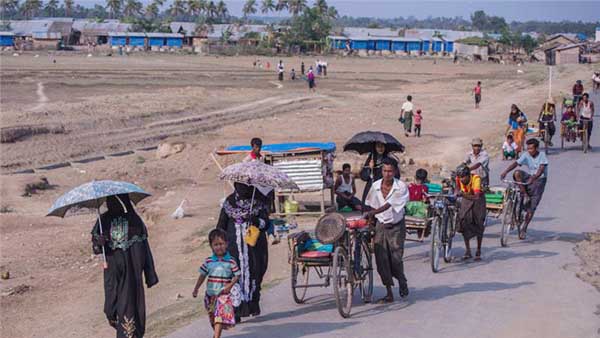
Al Jazeera Rakhine State :
As the sun creeps towards its midday peak, Soe Myat Naing’s house grows insufferably hot. Despite the stifling air, he dare not leave the safety of his oven walls and sits with unease, waiting for his cue to flee.
“We have to run away from our village when the military comes, they threaten the men so we have to run and leave the women. When we are not in the villages they go into our houses and take our possessions” he says.
Three days ago the Myanmar army raided the village of Nga Sar Kyu in northern Rakhine state where Soe Myat Naing lives with his family. They stole his solar panels, but did not stop at this.
“They arrested 30 women and raped 19, including my younger sister who is 23 years old. She cannot walk,” he says. “The situation is getting worse every day.”
The Myanmar military have been conducting a brutal operation in northern Rakhine for the past month and stand accused of a litany of human rights abuses against the local Rohingya population, which include extrajudicial killing , sexual assault and arson.
The operation was launched in response to a series of coordinated attacks on three border guard posts in Maungdaw township in early October, which left nine police officers dead. The government blamed the attack on a group of 400 Rohingya militants from a previously unknown organisation called Aqa Mul Mujahidin ‘. Last week, another policeman was killed in a shooting at a border guard post in Maungdaw township. Humanitarian organisations estimate that as many as 15,000 Rohingya Muslims have been displaced from their homes in Northern Rakhine state since the counterinsurgency operation began.
However, aid workers have been prohibited from attending to their needs. Foreign and independent journalists have also been blocked from the military zone, while others have been harassed for reporting on the alleged abuses.
Last week, a delegation of foreign diplomats were granted access to several villages in Maungdaw township but were not taken to the scene of the most grave allegations against the security forces.
Nevertheless, UN coordinator Renata Lok-Dessallien called on the Myanmar government to launch an independent investigation into the alleged human rights abuses.
“The worrying thing about these human rights abuses is that the government deny every single allegation. They have put down the rape allegations and that [the military] have been burning houses, even though it has been confirmed,” says Chris Lewa, of the advocacy group Arakan Project, who have sources across Maungdaw township.
“The biggest problem right now is that [the military] have expanded their area of operation so even more people are experiencing raids, looting and arrests,” she says.
READ MORE: Rakhine in Myanmar’s Sittwe tell of renewed attacks
A nationalist agenda
With every day that the military operation continues comes greater pressure from the international community for the persecution of Myanmar’s Rohingya population to stop.
This, however, is of little consequence to the regional government which is heavily represented by the Arakan National Party, an ethnic Rakhine political group that pursues a nationalist agenda.

